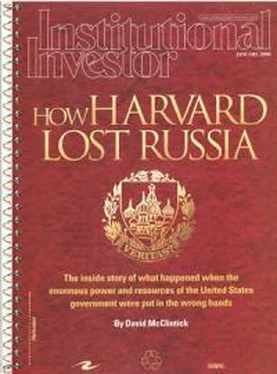Copyright 1993, the President and Fellows of Harvard College and the Massachusetts Institute of Technology.
Compare this paper with the assessment of his own behavior in the article "On Post-Modern Corruption"(Economic Principals):
It is against this background that a seemingly unrelated matter, the Andrei Shleifer case, should be considered. Readers are all too familiar with the details of how a 31-year-old Russian expatriate, swiftly risen to eminence as a Harvard University economics professor, was put in charge in 1992 of a huge US government-financed, Harvard-administered mission to advise the Russian government of Boris Yeltsin on how to establish a market economy of their own -- until he was discovered in 1996 to be lining his own pockets, and those of his wife, his deputy and the deputy's girlfriend . At that point the mission collapsed.
Four years later, the US Attorney in Boston sued. Four years after that, Shleifer was found to have committed fraud and Harvard University to have breached its contract . Each was ordered to repay the government.
Perhaps the Shleifer story is no big deal, and not the symbol of post-modern corruption having spread to universities that I think it is. Yet there are similarities to the Congressional situation, I believe. The case against Shleifer case was a civil complaint, not a criminal charge. Cunningham was elected, Shleifer was hired. Each helped himself to some good old-fashioned graft, and each was found by a court to have done (in the words of the San Diego prosecutor) "the worst thing an Éofficial can do -- he enriched himself through his position and violated the trust of those who put him there."
And just as the tactics of the House leadership are more alarming than the conduct of the lowly Cunningham, so the determination of Harvard's administrators to defend Shleifer for nine long years is more astounding than what Shleifer actually did. He was young and inexperienced. They had all the advice and time in the world. His culpability has been established. Theirs has barely been addressed.
Here is some information about the events form Wikipedia article Andrei Shleifer:
Controversy
Under the False Claims Act, the US government sued Harvard, Shleifer, Shleifer's wife, Shleifer's assistant Jonathan Hay, and Hay's girlfriend (now his wife) Elizabeth Hebert, because these individuals bought Russian stocks and GKOs while they were working on the country's privatization, which potentially contravened Harvard's contract with USAID. In 2001, a federal judge dismissed all charges against Zimmerman and Hebert.[4] In June 2004, a federal judge ruled that Harvard had violated the contract but was not liable for treble damages, but that Shleifer and Hay might be held liable for treble damages (up to $105 million) if found guilty by a jury [2].
In June 2005, Harvard and Shleifer announced that they had reached a tentative settlement with the US government. On August 3 of the same year, Harvard University, Shleifer and the Justice department reached an agreement under which the university paid $26.5 million to settle the five-year-old lawsuit. Shleifer was also responsible for paying $2 million dollars worth of damages, though he did not admit any wrong doing. A firm owned by his wife previously had paid $1.5 million in an out of court settlement.
Because Harvard University paid most of the damages and allowed Shleifer to retain his faculty position, the settlement provoked allegations of favoritism on the part of Harvard's outgoing president Lawrence Summers, who is Shleifer's close friend and mentor. Shleifer's conduct was reviewed by Harvard's internal ethics committee. In October 2006, at the close of that review, Shleifer released a statement making it clear that he remains on Harvard's faculty. However, according to the Boston Globe, he has been stripped of his honorary title of Whipple V. N. Jones Professor of Economics[3].
Shleifer's involvement in Russia was investigated by David McClintick, a Harvard alumnus and journalist for Institutional Investor Magazine. His 30-page January 2006 article claims to show that "economics professor Andrei Shleifer, in the mid-1990s, led a Harvard advisory program in Russia that collapsed in disgrace." The article drew considerable criticism among Shleifer's colleagues, collaborators, close friends, and students. According to the Harvard Crimson[4], the university's daily newspaper, Shleifer's colleague and economics professor Edward Glaeser said that the Institutional Investor article "is a potent piece of hate creation—not quite 'The Protocols of the Elders of Zion,' but it's in that camp." But Glaeser later apologized for his statement[5].
Larry Summers was not only defender but also the handler of Andrei Shleifer
Prominent role of Larry Summers in Andrei Shleifer affair shed very negative light on this very controversial figure. Positioning him as a key figured in Clinton administration intended to destroy the xUSSR republic economies, especially economics of Russia. And that role perfectly alight with his general political role in Clinton administration and after that. The role of enforcer of neoliberal social order. Role of Larry Summers in adopting "shock therapy" and Yeltsin privatization of state assets still needs to be investigated. But it is perfectly consistent with his track record. Among key "mis-achievements" of Bubble Boy Larry:
A prominent role in repealing of Glass-Steagall
The bill that ultimately repealed the Act was introduced in the Senate by Phil Gramm (Republican of Texas) and in the House of Representatives by Iowa) in 1999. The bills were passed by Republican majorities on party lines by a 54-44 vote in the Senate[12] and by a 343-86 vote in the House of Representatives[13]. After passing both the Senate and House the bill was moved to a conference committee to work out the differences between the Senate and House versions. The final bill resolving the differences was passed in the Senate 90-8 (1 not voting) and in the House: 362-57 (15 not voting). [These margins of passage, if repeated, would have been well over the two-thirds needed to overcome any veto, had the President returned the bill to Congress without his signature.] The legislation was signed into law by President Bill Clinton on November 12, 1999. [14]
The banking industry had been seeking the repeal of Glass-Steagall since at least the 1980s. In 1987 the Congressional Research Service prepared a report which explored the case for preserving Glass-Steagall and the case against preserving the act.[7]
A prominent role in killing attempt of derivatives regulation byBrooksley Born. Summers "led the opposition" against Brooksley Born, a Clinton appointee became the head of the CFTC in 1996 and refused to accept the industry's stance. "In late 1997 and early 1998, she said the emperor has no clothes," says Greenberger. "She said that derivatives are futures contracts and that the CFTC had jurisdiction." In the 2003 interview, Ms. Born reveals that it was Wendy Gramm who single handedly made OTC derivatives possible by adopting a regulatory exemption as "virtually the last act as CFTC chair." This article from Stanford Magazine details the dirty tricks used by Three Marketers (Summers, Rubin and Greenspan) in blocking her regulatory efforts of the derivatives market whatsoever on a very simple ground that the financial industry and its lobbyists were objecting:
As chairperson of the CFTC, Born advocated reining in the huge and growing market for financial derivatives. . . . One type of derivative—known as a credit-default swap—has been a key contributor to the economy’s recent unraveling. . .
Читать дальше






![Джонатан Димблби - Barbarossa - How Hitler Lost the War [calibre]](/books/385421/dzhonatan-dimblbi-barbarossa-how-hitler-lost-the-w-thumb.webp)





